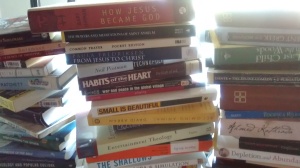
When theological disagreements get personal, it has a way of messing with a theologian’s soul.
Those of us trying to make a living out of thinking like to convince ourselves that ours is the most important task – that if we get our facts in a row and our arguments right, if we use the correct hermeneutic and the most accurate sources, we can unravel at least a few quandaries, come to some agreement, and know What’s Right for once and for all. We might tell you it’s about belief and truth and the ways our words can alter our realities, and we would believe ourselves. But just as often, it’s simply about making our homes in books and theories. When school has always been easy for you, you think keeping God there will make God easy. You hope that the theoretical world can make the real world into the place you want it to be.
So when arguments come to an impasse, or our brothers and sisters simply tune us out – when our ideas fail to change others’ behavior –
we’re likely to have a bit of a meltdown. Or, even more often, to reassure ourselves that We’re Right, denounce those other parties, and take our pocket concordances elsewhere, much to the relief of those we’re trying to spite. Churches, schools, nonprofits beware: self-righteousness will destroy all diversity of opinion faster than you can say “interpretation”.
I had just such a dustup with my church in Boston this year, and it nearly ruined me. I’d always known theology could be used to hurt people; but finally confronted with my inability to Set It Right (from my perspective, of course), I sort of lost my will to live (as a theologian). If two people can study hard, care deeply, love Jesus, and come to opposite conclusions, what is the point? A question theologians often ask each other in the honest light of a couple of drinks – are we just making stuff up here?
Months into my slough of despond, pondering some unrelated episode, an observation blazed into my mind, answering for me the argument at hand and the question it provoked. God has never spoken to me about my theology, I realized; only about our hearts.
The longer I study and pray, the less I am convinced – as maybe I was when I started this journey – that the world is a puzzle, where God has hidden clues about herself for our little brains to busily connect, rearrange, and cogitate until we stumble upon The Right Answer. I think God wants us to look for her, but I don’t think she’s hiding at all. Of course she’s in the onion-paper sheets of the Bible and the languages histories, traditions that help us interpret it. But, as the Bible says, God also speaks the languages of rock and tree, works in all of our histories, and asks us to live both in deepest reverence and radical defiance of tradition.
And, as the Bible says, God takes it upon himself just to speak to us. I believe in that kind of a living revelation – in a God greater than a book – in tongues and gifts, nudges and voices, in the knowledge of the heart and
body whe n the mind fails. I cast my lot with the mystics of Christianity – the Pentecostals, Quakers, Charismatics, Eastern Orthodox, the early church and all the holy fools ever to say that God lives and speaks in our hearts with knowing exactly what we could possibly mean.
n the mind fails. I cast my lot with the mystics of Christianity – the Pentecostals, Quakers, Charismatics, Eastern Orthodox, the early church and all the holy fools ever to say that God lives and speaks in our hearts with knowing exactly what we could possibly mean.
It is not the role of theological study to shackle our hearts and lives to the pages of books. It is to help us cleave ever closer to Jesus Christ, image of the Father, through the comfort and help of the Holy Spirit. My concern for “correct interpretation” – for orthodoxy – is just as strong as it’s ever been. Only I’m realizing that the authors of our scriptures were madmen and poets, priests and pastors, storytellers and prisoners – only a few wrote in comfort and solitude. Our greatest theologians have been dreamers, desert demon fighters, busy bishops, seers and itinerant preachers. God spoke to them through and into the circumstances of their lives; though remembering God’s past works was vital to them, they were not simply regurgitators or gatekeepers over other, older men’s words.
Those precious ancient texts remain central to my faith, plumb lines for the many voices speaking every day, reliable sources for hearing God’s voice. But that voice leads me always to overwhelming awe of God, greater compassion and gentleness and confidence, awareness of my own sin, recognition of the beauty and belovedness within myself that I so often bury. It does not offer systems for organizing reality or even deem for certain which translation from the Greek is better. When the words of scripture and tradition have transformed my theology, claiming my allegiance and submission despite myself, it is because I have recognized the character of God in them – not out of grudging, uncomprehending duty and not because they support my own position.
Academy-trained theologians are not the arbiters of doctrine, though we dearly wish we were. We interpret and champion the voices of the past, deeply undervalued in the 21st century – a hugely important task. And we may draw from other disciplines and theories to understand the world we mean to connect with, helping fellow Christians to see clearly what it is we have in common with our ancestors in the faith. But our task is incomplete without taking seriously the revelations of God to the illiterate and the child, the unholy and uninitiated, to the obviously wrong, the unfavored, the poor and the mad – and until we recognize ourselves among them.
And if in the end we come up with something that doesn’t sound mostly crazy, it’s a good sign we’ve really just been making stuff up.
I just finished rereading Melanchthon’s, “Common Topics.” His first edition from 1521, written when he was 23, is full of “shoot-from-the-hip” denunciations of “theologians” and “sophists” and an obsession with correctness. His last edition, written 30 years later, removes all that, acknowledges more readily his debt to precursors and slips in some ambiguity. Yesterday I edited a grad school paper I wrote two decades ago and did pretty much the same thing as Melanchthon–toned it down, removed the diatribes, added some impressionism. Is there not something to be said for the necessity first to make clear, sometimes to hyperbole, the separation between ideas and idea-givers and then, over time, to bring them together again in the light of life and communion? Thanks for the thoughts.
Praise God for those precious ancient texts that remain central to your faith, plumb lines for the many voices speaking every day, reliable sources for hearing God’s voice. Lyndsey, this speaks so well the foundation of my relationship with the Lord. Glad we share such a precious statement. Love you girl.
, grandma.